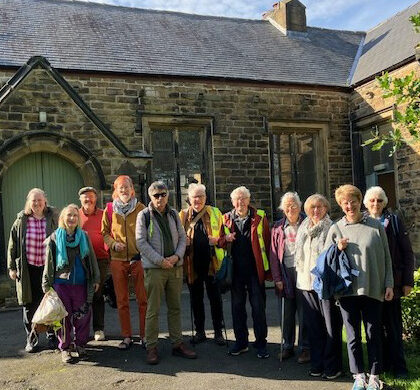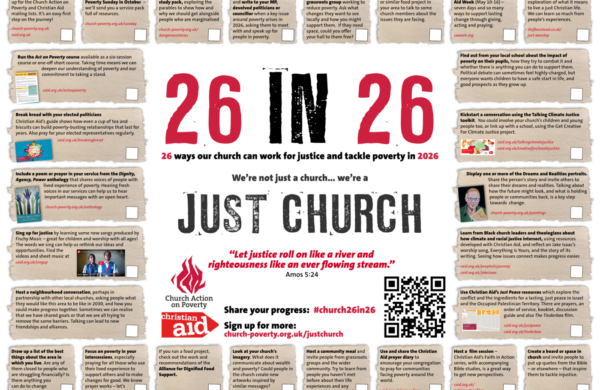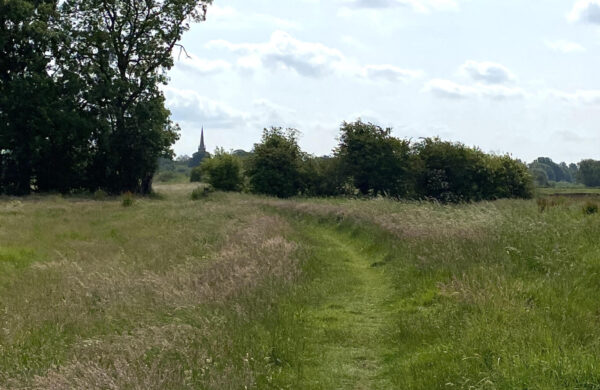Solidarity and sacrifice
Reflections from our 9 April online discussions on what it means to be church on the margins during the pandemic.
Opening reflection by Deirdre Brower Latz
The Church needs to change after Coronavirus
- The church needs to be called to account and radically share its resources
- Churches need to be transformed/reimagined/ authentic – not carry on as before
- Some churches are not involved in the crisis response / how are affluent areas responding?
- New collaborations and alliances should be maintained
Solidarity
- Many people are not online, some churches have been delivering resources to people to keep in touch
- Inequalities have been exposed
- ‘God is showing us new things from the perspective of the last and the least.’
- Lack of understanding among decision-makers
- Helping at the uber local level
- Chatting to people in the foodbank queue / checking in with people
- Increase in volunteering / kindness
- Communities are coming together
Sacrifice
- It’s an inconvenience for some, not a sacrifice
- Giving up small foodbank, letting bigger one take over to make sure resources reach people
- Being separated from people and the church building
- Domestic violence / conflicts at home
- Feeling / being powerless
Learning from others
- What can we learn from people who were marginalised before? E.g. some people with autism do not like touch / prefer social distance. What can we learn from this?
Holy Week and Easter
- Solidarity of Jesus / turning the tables
- Foot washing / caring / nursing / healing / self-care
- Receiving, not giving (is ok) – gratitude
- Sadness and joy in Easter
Reaching people
- Some people have no way of communicating at the moment, no phone or internet
- Reaching people who are homeless ?
Voice
- Importance of speaking to society / government about how people are being affected – people to speak out
- Disability activism
- Society has to change
Reimagining
- Solidarity and sacrifice as counter- infections (fighting the virus)

Research and Information Officer
Pilgrims call for more support in low-income neighbourhoods
Bob Rae reports on Sheffield Church Action on Poverty’s annual pilgrimage Anti-poverty campaigners in the Sheffield neighbourhoods of Firvale, Wincobank and Firth Park are calling for major improvement …
26 in 26: The new social justice poster for churches
Justice is integral to our faith. Church Action on Poverty and Christian Aid have teamed up to produce a new poster that your whole church …
How should churches address rural poverty?
How is rural poverty changing, and how should churches, dioceses and Government respond? Paul Phillips explores the issue, and reports on his diocese’s work. In …
Faith In The City: why it still matters, 40 years on
In a new book, authors Terry Drummond and Joseph Forde revisit the landmark Faith In The City report, 40 years on. Faith in the City, …
Pantries reach 1 million visits – as new research proves they work
Community breakfast held to mark millionth visit New research shows Pantries improve people’s health, reduce worries and reunite communities Thank you for your amazing support! …
Grief is hard enough: it’s time to improve funeral support
Lindesay Mace from Quaker Social Action outlines their latest work to help people with funeral costs Bereavement can be a deeply challenging experience. In the …
New toolkit: Hosting a regional anti-poverty roundtable
Our new roundtable guide will help churches or dioceses to host productive regional events We’ve published a new resource for churches and dioceses who would …
Pilgrims call for more support in low-income neighbourhoods
Bob Rae reports on Sheffield Church Action on Poverty’s annual pilgrimage Anti-poverty campaigners in the Sheffield neighbourhoods of Firvale, Wincobank …
26 in 26: The new social justice poster for churches
Justice is integral to our faith. Church Action on Poverty and Christian Aid have teamed up to produce a new …
How should churches address rural poverty?
How is rural poverty changing, and how should churches, dioceses and Government respond? Paul Phillips explores the issue, and reports …



